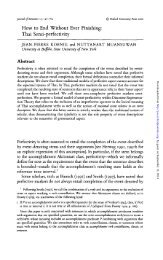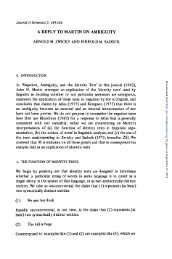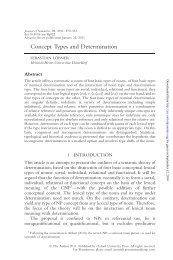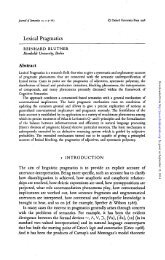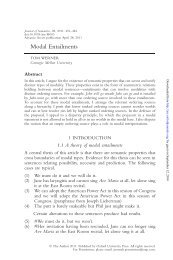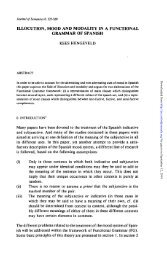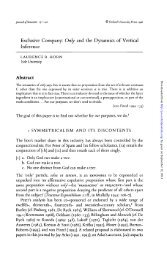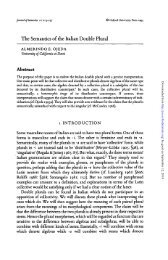Aspectual Coercion and Logical Polysemy - Journal of Semantics
Aspectual Coercion and Logical Polysemy - Journal of Semantics
Aspectual Coercion and Logical Polysemy - Journal of Semantics
Create successful ePaper yourself
Turn your PDF publications into a flip-book with our unique Google optimized e-Paper software.
142 <strong>Aspectual</strong> <strong>Coercion</strong> <strong>and</strong> <strong>Logical</strong> <strong>Polysemy</strong><br />
events <strong>and</strong> have no lexical causative counterpart. Verbs such as sink <strong>and</strong> break,<br />
however, appear in both unaccusative <strong>and</strong> causative constructions, due to the<br />
headless nature <strong>of</strong> the underlying event structure associated with the verbal<br />
semantics.<br />
5 COERCION WITH ASPECTUAL VERBS<br />
In this section, we examine in more detail the behavior <strong>of</strong> the three French <strong>and</strong><br />
English aspectual verbs commencer (begin), finir (finish), <strong>and</strong> arreter (stop) with<br />
respect to complement selection <strong>and</strong> coercion. In particular, we observe that<br />
commencer <strong>and</strong> finir <strong>and</strong> begin <strong>and</strong> finish permit NP coercion while arreter <strong>and</strong><br />
stop do not. We see that both commencer <strong>and</strong> begin <strong>and</strong> arreter <strong>and</strong> stop are<br />
polysemous between both raising <strong>and</strong> control senses, <strong>and</strong> we show why this<br />
polysemy exists. 8 Interestingly, however, while the English verb finish exhibits<br />
only a control reading, we observe that the French verb finir appears to be<br />
polysemous between control <strong>and</strong> raising senses, but in fact is strictly a control<br />
verb.<br />
We saw in Section 3 how commencer <strong>and</strong> begin allow both VP <strong>and</strong> NP<br />
complements, the latter which we analyzed as resulting from type coercion (cf.<br />
(1) <strong>and</strong> (2) repeated below):<br />
(1) a. John began to read the book. (VP[+INF])<br />
b. John began reading the book (VP[+PRG])<br />
c. John began the book, (NP)<br />
(2) a. Jean a commence a lire le livre. (VP[+INF])<br />
b. Jean a commence le livre. (NP)<br />
The aspectual verbs finir <strong>and</strong> finish also allow multiple complements types,<br />
patterning in a similar fashion (cf. (15) <strong>and</strong> (16)):<br />
(15) a. He has finished reading the book. (VP[+PRG])<br />
b. He has finished the book (NP)<br />
(16) a. Il a fini de lire son livre. (VP[+INF])<br />
b. Il a fini le livre. (NP)<br />
Downloaded from http://jos.oxfordjournals.org/ by guest on September 12, 2014<br />
Like commencer <strong>and</strong> begin, they also permit certain bounded NPs as complements<br />
but disallow coercion with the same class <strong>of</strong> NPs prohibited by<br />
commencer <strong>and</strong> begin, as illustrated in (17) <strong>and</strong> (18) below.<br />
(17) a. *I finished the symphony, (listening)<br />
b. I finished the chocolate, (eating)<br />
c. *I finished chocolate, (eating)



